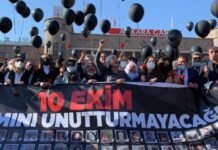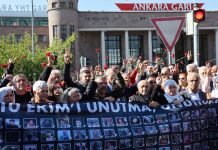The Turkish government has been recruiting and retraining jihadist Islamic State of Iraq and the Levant (ISIL) militants in its ongoing offensive in Afrin province of northern Syria, according to a former-ISIL militant.
During a phone interview with The Independent, a former ISIL militant named Faraj from northeast Syria, who reportedly closely monitors the movement of extremist jihadists, claimed Turkish government was “training ISIL members and sending them to Afrin.”
“Most of those who are fighting in Afrin against the People’s Protection Units (YPG) are ISIL, though Turkey has trained them to change their assault tactics,” the former ISIL member stated.
Faraj, 32, said he does not support the Kurdish forces but is also skeptical about Turkey’s manipulation of ISIL militants, adding Ankara is using the Free Syrian Army (FSA) as a decoy to cover their alignment with the extremist group. “Turkey treats ISIL like toilet tissues,” he told The Independent. “After use, they will be thrown away.”
According to Faraj, Turkish commanders have retrained the extremists to abandon their traditional tactics of suicide bombings and car bombings “because this would make the ISIL-Turkish cooperation too blatant.” “We leave the suicide attacks for the YPG and PKK so that the world will be convinced that they are terrorists,” the 32-year-old quoted a Turkish officer.
Meanwhile, it was reported on Thursday that no Turkish military helicopters or warplanes have entered Syrian airspace since Feb. 4, the day after a Russian plane was shot down in the area of Idlib.
Cumhuriyet daily cited a report saying that Russia was introducing a new air defence system and saying that the Turkish air force was expecting to be allowed back into Syria to support the ongoing Turkish military campaign in the Afrin region after the installation was completed.
Syrian opposition fighters are thought to have downed the Russian Su-25 fighter jet using a shoulder-mounted ground-to-air missile system, the newspaper said, and Russia had closed Syrian airspace while installing a counter-system.
Turkish government spokesman Bekir Bozdağ said on Monday night that Afrin’s airspace was open, but security sources told Cumhuriyet that Turkish warplanes and helicopters had only been patrolling the Turkish side of the Syrian border and not crossing since then.
The Turkish military has not mentioned any air operations in its daily reports since the morning of Monday Feb. 5, Cumhuriyet daily reported.
On Jan. 20, Turkish warplanes began striking Afrin as dozens of civilians, including children and women, were reported to have been killed by air raids and shelling.
Turkish autocratic President Recep Tayyip Erdoğan has labeled the campaign “Operation Olive Branch,” and says the offensive is meant to clear Syria’s Kurdish-held northwest district of YPG militants who Turkey claims are an offshoot of the outlawed Kurdistan Workers’ Party (PKK). Ankara argues the US-backed Kurdish forces are a “terrorist organization” and has been incensed by Washington’s support for the YPG.















